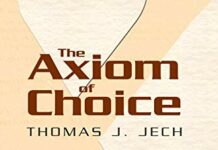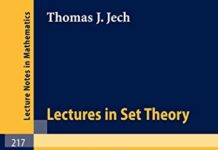
Ebook Info
- Published: 2008
- Number of pages: 224 pages
- Format: PDF
- File Size: 6.69 MB
- Authors: Thomas J. Jech
Description
Comprehensive in its selection of topics and results, this self-contained text examines the relative strengths and consequences of the axiom of choice. Each chapter contains several problems, graded according to difficulty, and concludes with some historical remarks.An introduction to the use of the axiom of choice is followed by explorations of consistency, permutation models, and independence. Subsequent chapters examine embedding theorems, models with finite supports, weaker versions of the axiom, and nontransferable statements. The final sections consider mathematics without choice, cardinal numbers in set theory without choice, and properties that contradict the axiom of choice, including the axiom of determinacy and related topics
User’s Reviews
Reviews from Amazon users which were colected at the time this book was published on the website:
⭐This book is ideal if, like me, you are undecided about whether the axiom(s) of choice should be accepted, rejected, or carefully interpreted and managed. Jech summarises the relevant model theory and applies this to the principal AC issues.This Dover book, “The axiom of choice”, by Thomas Jech (ISBN 978-0-486-46624-8), written in 1973, should not be judged as a textbook on mathematical logic or model theory. It is clearly a monograph focused on axiom-of-choice questions. However, it contains many insights into mathematical logic and model theory which I have not obtained from the other 35 books on these subjects which I have on my book-shelf.* Chapter 1 (8 pages): Introduction. Gives some really good reasons why you should reject the axiom of choice, especially Lebesgue non-measurable sets and a “paradoxical decomposition of the sphere”, attributed to Hausdorff (1915) and Banach/Tarski (1924). The Banach-Tarski theorem is also mentioned (very briefly) by Roger Penrose in his popular book
⭐, page 366, as a reason to reject AC.* Chapter 2 (22 pages): AC equivalents and applications to get some “nice” theorems in many areas of mathematics, particularly the prime ideal theorem, applications of countable choice to analysis, and consequences for cardinal numbers. (In my opinion, AC is a magic wand which makes your wishes come true, not serious mathematics! But I’m in a minority on this issue.)* Chapter 3 (13 pages): Consistency of AC with ZF, which is demonstrated by the constructible universe. (There’s a very much better presentation of the constructible universe in Shoenfield’s
⭐.) Also in this chapter is the definition of transitive models, particularly in relation to ZF and the 8 Gödel operations.* Chapter 4 (11 pages): Permutation models, including the “basic Fraenkel model” (N1), the “second Fraenkel model” (N2), and the “ordered Mostowski model” (N3). The numbers in parentheses are my guess of the model number in the comprehensive book of ZF models,
⭐by Howard and Rubin.* Chapter 5 (30 pages): Independence of the axiom of choice (from the ZF axioms). This goes further into model theory and describes the “basic Cohen model” (M1) and the “second Cohen model” (M7). (Howard/Rubin model number guesses in parentheses.) Various independence results follow from these models, including the 1963 Cohen proof that AC and GCH are independent of ZF.* Chapter 6 (12 pages): Embedding theorems. Not of much interest to me personally.* Chapter 7 (22 pages): Models with finite supports. Covers independence of AC from the Prime Ideal Theorem, independence of PIT from the Ordering Principle, and a couple of independence theorems for AC for finite sets.* Chapter 8 (24 pages): Weaker versions of AC, including independence results for dependent choice.* Chapter 9 (8 pages): Nontransferable statements. Some results using ZFA (ZF with atoms). I have no idea what this is about.* Chapter 10 (10 pages): What you lose if you reject AC. This is a short summary, but it usefully includes the Solovay model (1965, 1970) which I’m pretty sure is model M5(ℵ) in Howard/Rubin. The Solovay model is interesting because dependent choice and countable choice hold, but general AC does not. (The Howard/Rubin book is totally comprehensive regarding consequences of rejecting AC and is therefore far preferable.)* Chapter 11 (16 pages): What happens to cardinal number theory if you reject AC.* Chapter 12 (16 pages): “Some properties contradicting the axiom of choice”. Has something to do with measurable cardinals. Not of much interest to me (probably).This book has lots of exercises, which I have not attempted because I’m too lazy. Maybe as much as a quarter or third of the book consists of exercises.* Conclusion:In my opinion, this is an invaluable book for its coverage of the basic issues concerning the axiom of choice. It is also particularly valuable for its clear (and brief) explanation of several ZF models which are particularly useful for demonstrating various independence and consistency results. The quite detailed summary of the Hausdorff/Banach/Tarski paradoxical decomposition of the sphere particularly interested me.* PS. 2013-3-31.Six days ago, I received
⭐. I haven’t read enough of this book by Gregory H. Moore to write a review yet, but I am enormously impressed by it. I think it covers pretty much the same areas as the Jech book, and much, much more.
⭐Great book, excellent condition!Am still reading it!
⭐This is a brilliant book and it is great to see it back in print. As the content is not available on Amazon, it is something like this:1. Introduction (Axiom of choice, non-measurable set of real numbers, paradoxical decomposition of the sphere)2. Uses of the Axiom of Choice (Equivalents, applications, countable version)3. Consistency of the Axiom of Choice (Constructible universe, etc.)4. Permutation Models (Fraenkel models, etc.)5. Independence of the Axiom of Choice (Cohen’s models, etc.)6. Embedding Theorems7. Models with finite support (Showing prime ideal theorem weaker than choice, etc.)8. Some weaker versions of the Axiom of Choice (Dependent choice)9. Nontransferable statements (talking about ZF+atoms)10. Mathematics without choice (e.g. a model where the reals are a countable union of countable sets)11. Cardinal numbers in set theory without choice12. Some properties contradicting the axiom of choice (e.g. determinateness, all sets measurable, etc.)Hope that helps.
⭐選択公理に特化した公理的集合論の本です。40年以上前、記号論理学シリーズの1冊として、数学科の図書室から借りて読みました。選択公理の独立性証明は、コーヘン以前に、フレンケルが アトムを持つ公理系に対して行ないました。コーヘンの証明は、フレンケルの証明のアトムを 整数の一般部分集合に置き換えたものです。…など楽しく読みました。
⭐
Keywords
Free Download The Axiom of Choice (Dover Books on Mathematics) in PDF format
The Axiom of Choice (Dover Books on Mathematics) PDF Free Download
Download The Axiom of Choice (Dover Books on Mathematics) 2008 PDF Free
The Axiom of Choice (Dover Books on Mathematics) 2008 PDF Free Download
Download The Axiom of Choice (Dover Books on Mathematics) PDF
Free Download Ebook The Axiom of Choice (Dover Books on Mathematics)

